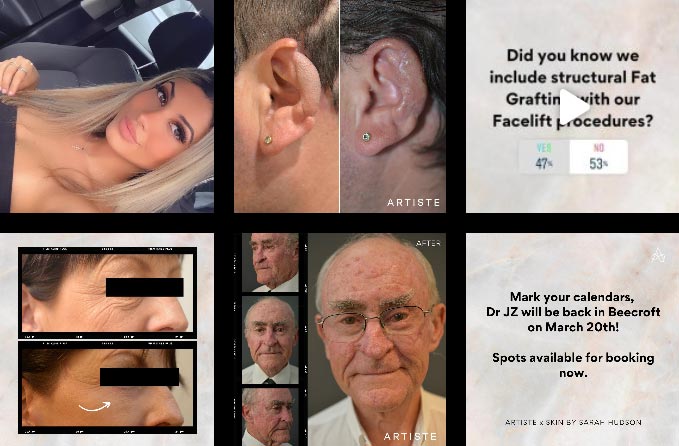In an article published in Still Mind Florida, plastic surgery addiction can be defined as a behavioural disorder characterised by an overwhelming desire to undergo multiple cosmetic procedures. This compulsion often stems from a combination of psychological and societal factors. In this blog, we share general information about the potential underlying causes that are essential for recognising and addressing the issue effectively.
Body Dysmorphic Disorder (BDD)
A significant psychological factor contributing to plastic surgery addiction is Body Dysmorphic Disorder (BDD). Individuals with BDD experience persistent and intrusive preoccupations with perceived defects in their appearance, which are often minor or imagined. This distorted self-image can lead them to seek multiple cosmetic surgeries in an attempt to address these flaws. However, surgical interventions typically do not alleviate the psychological distress associated with BDD and may even exacerbate it.
Societal Pressures and Media Influence
Societal standards of beauty, perpetuated by media and advertising, play a substantial role in the development of plastic surgery addiction. The portrayal of idealised and often unattainable beauty standards can lead individuals to feel inadequate or dissatisfied with their natural appearance.
In Australia, societal pressures and media influence significantly contribute to the increasing consideration and pursuit of cosmetic surgery, particularly among young women. A study by the University of South Australia found that 16% of women aged 18 to 29 had already undergone cosmetic surgery, and more than half (54%) would consider it in the future. This trend is closely linked to the pervasive presence of social media, which often promotes unattainable beauty standards. Regular engagement with these platforms has been associated with excessive self-judgment and a heightened likelihood of considering cosmetic procedures.
Low Self-Esteem and Psychological Distress
Individuals with low self-esteem or underlying psychological distress may be more susceptible to developing an addiction to plastic surgery. They might perceive cosmetic procedures as a means to enhance their self-worth or cope with emotional difficulties. However, without addressing the root psychological issues, the temporary satisfaction gained from surgery can lead to a cycle of repeated procedures without achieving lasting contentment.
The Role of Social Media
The influence of social media cannot be overlooked when considering factors contributing to plastic surgery addiction. Platforms like Instagram and Tiktok may often showcase idealised beauty standards through filters and curated content, leading individuals to feel inadequate about their natural appearance. This dissatisfaction can drive some to seek cosmetic procedures to emulate the enhanced images they encounter online. The term ‘Instagram face‘ describes individuals desiring surgery to resemble their filtered selfies, highlighting the profound impact of social media on body image perceptions.
Encouraging Professional Consultation
If you or someone you know is considering cosmetic surgery, it’s crucial to consult with qualified healthcare professionals. In Australia, obtaining a referral from a general practitioner (GP) and undergoing a BDD screening are now mandatory for all patients seeking cosmetic surgery. This process ensures that your overall health is assessed, including any underlying psychological factors. Addressing these psychological aspects with the help of mental health professionals ensures that decisions regarding plastic surgery are made safely and appropriately, prioritising your well-being.
For more information about plastic surgery, including the associated risks and what to expect, reach out to our Specialist Plastic Surgeon, Dr Jack Zoumaras. During your consultation, you can address any concerns, and he will assess your unique situation. Schedule an appointment today.
Disclaimer: At Artiste Plastic Surgery, our Plastic Surgeons led by Dr Jack Zoumaras have been trained to the highest possible degree. All surgery has risks and it is always advised to get a second opinion. Risks are very real and we cannot guarantee any result. Results are illustrated as a guide only. All risks are managed and any need for revision surgery or complications (1-5%) can be managed by our specialist plastic surgeons.
Any statements on how you will feel is based on Level V Evidence:
Level V: How you will feel after plastic surgery varies between individuals, depending on psychological and physical factors. Our internal research is based on how patients in our practice feel after surgery.
The blogs are not a substitute for a medical consultation and do not form as part of the doctor to patient relationship.
SHARE THIS ARTICLE
Feb02
Planning Facial Surgery in Bondi Junction? What You Should Know
Disclaimer: At Artiste Plastic Surgery, our Plastic Surgeons led by Dr Jack Zoumaras have been trained to the highest possible degree. All surgery has risks and it is always advised ...
Feb02
Why Experience Matters: What to Look for in a Facial Plastic Surgeon
Disclaimer: At Artiste Plastic Surgery, our Plastic Surgeons led by Dr Jack Zoumaras have been trained to the highest possible degree. All surgery has risks and it is always advised ...
ABOUT ARTISTE
Artiste Plastic Surgery is an Award Winning Specialist Plastic Surgery practice led by internationally trained Dr. Jack Zoumaras, Plastic Surgeon and Peer Reviewed Face Surgeon
Artiste offers the latest Cosmetic Surgical Procedures of the Face, Breast and Body, inspired from leading centres around the world.
STAY IN THE LOOP
Enter your email address below to receive updates on new articles and VIP access to promotions and special offers.
FOLLOW US ON INSTAGRAM
